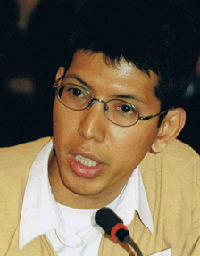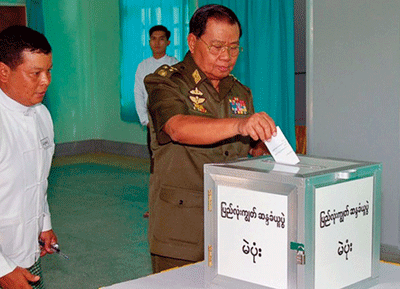Loopholes in the new Burmese constitution could be exploited by opposition groups to win influence after next year’s election
In politics, a direct, frontal attack is rarely wise; co-opting the opponent’s game plan for one’s own purposes is a more powerful ploy. Opponents of Burma’s military junta should bear this in mind as they consider their strategy for dealing with next year’s election.
 |
| Min Zin is a Burmese journalist in exile and a teaching fellow at the University of California, Berkeley, School of Journalism. A longer version of this article is available on www2.irrawaddy.com |
Most mainstream opposition groups, including the National League for Democracy (NLD) and major ethnic ceasefire groups, have announced that they will not take part in the 2010 election unless the constitution is revised and the political process is made more inclusive. They say they can’t accept the constitution as it stands because it denies fundamental ethnic rights and allows the military to seize power again “if there arises a state of emergency.”
A closer examination of the junta’s constitution reveals, however, that it is not the impregnable fortress that it at first appears to be. There are a number of weaknesses in the castle battlements that opposition groups can exploit if they are prepared to take a multi-pronged approach.
The first vulnerability lies in the fact that after the 2010 election, there will be two power centers, the military and the government, which will inevitably be at loggerheads over the command structure and personal interests. No matter who pulls the strings, this new power arrangement will lead to either a serious internal split or the inefficiency of the ruling body.
Another Achilles’ heel is the constitution’s de facto demotion of regional military commanders. Although the constitution enshrines ultimate power in the commander in chief of the military, it fails to provide similar authority to regional commanders in their localities. As key pillars in the military regime’s power structure, the regional commanders are like warlords in their domains. However, under the new constitution, they are under the control of the chief ministers of the regions or states, who in many cases may be civilians. This could result in a situation where regional commanders oppose not only local power arrangements but also Naypyidaw’s control.
The third loophole in the constitution is that if non-military parties sweep to victory or win a clear majority of the 75 percent of seats not reserved for the military, a non-military candidate could become president. Failing this, non-military parties could gain control of the legislative agenda, giving them influence over everything from defense and foreign affairs to the economic and social sectors. Thus Snr-Gen Than Shwe, who leads the ruling junta, appears to be determined to fill the remaining parliamentary seats with members of a military-backed political party based upon the membership of the Union Solidarity and Development Association (USDA), a mass organization formed by the junta in September 1993.
 |
| Snr-Gen Than Shwe votes in the referundum election on the new constitution. |
However, this leads to the fourth problem facing the regime. As a political party, the USDA’s existing nationwide organizational structure (and its thuggish reputation, which could be used to intimidate voters) would give it a great advantage in the 2010 election. The problem is that the new constitution bars parliamentary candidates from receiving any support directly or indirectly from the state. As the USDA currently enjoys such advantages, it would run afoul of the regime’s own constitution if it sought to field candidates in the election.


